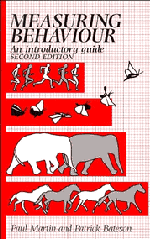Book contents
- Frontmatter
- Contents
- Preface to first edition
- Preface to second edition
- Summary: the steps involved in measuring behaviour
- 1 Introduction
- 2 General issues
- 3 Research design
- 4 Preliminaries to measurement
- 5 Measures of behaviour
- 6 Recording methods
- 7 The recording medium
- 8 The reliability and validity of measures
- 9 Analysis and interpretation of data
- Appendices
- Annotated bibliography
- Index
3 - Research design
Published online by Cambridge University Press: 05 June 2012
- Frontmatter
- Contents
- Preface to first edition
- Preface to second edition
- Summary: the steps involved in measuring behaviour
- 1 Introduction
- 2 General issues
- 3 Research design
- 4 Preliminaries to measurement
- 5 Measures of behaviour
- 6 Recording methods
- 7 The recording medium
- 8 The reliability and validity of measures
- 9 Analysis and interpretation of data
- Appendices
- Annotated bibliography
- Index
Summary
Rules for research
Formal prescriptions about the way in which scientific research should be conducted often fail to capture the flair, intuition and idiosyncrasies of the best scientists. Therefore, advice on how to organise thought and carry out research has to be given and taken with caution. Some people start studying a particular species simply because they find the animal interesting. Other scientists are initially more interested in a theoretical problem and, if they are wise, choose an animal that is especially suitable for studying that problem. It is not obvious that one approach is better than the other and, indeed, they are usually complementary.
Empirical data that distinguish between competing hypotheses can be obtained by observing natural variation as well as by performing controlled experiments. Thus, for many purposes, it is unnecessary to draw a rigid distinction between observational and experimental research. Many questions about behaviour are most appropriately answered by observational research. Moreover, in order to be effective, experimental research almost invariably needs to be preceded by observation. Knowledge of the normal behaviour of healthy animals, preferably in their natural environment, is an essential precursor to experimental research (see section 2.E on field studies). One of the distinguishing features of the ethological approach to studying behaviour has been its emphasis on combining observation with experiment.
Laboratory and field experiments
The point of doing an experiment is to distinguish between alternative explanations or hypotheses.
Information
- Type
- Chapter
- Information
- Measuring BehaviourAn Introductory Guide, pp. 25 - 55Publisher: Cambridge University PressPrint publication year: 1993
